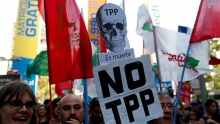SIgning the Trans Pacific Partnership Agreement (TPP) on International Women’s Day is an insult to women workers

The new, cynically rebranded deal, the addition of a non-binding and misleading preamble and the temporary suspension of some articles, have failed to address fundamental flaws contained in the TPP or to mitigate the harm it will cause women workers in the 11 signatory countries.
It is particularly insulting that the 11 governments selected International Women’s Day to sign the world largest trade and investment deals which researchers say will increase inequality and discriminate against women. For more than 100 years International Women’s Day has commemorated the struggle for women’s human rights, inspired by the pursuit of justice for 126 women garment workers killed in the Triangle Shirt Factory fire in New York. International Women’s Day is founded on women’s collective struggle to counter the power of corporate interests and secure fair wages, safe working conditions and trade union rights, yet governments will commemorate the day by signing an agreement designed to increase corporate power and diminish the capacity of the state to regulate and collect revenue required to support public services essential for women’s rights.
It is well documented that the neo-liberal project involving privatisation; deregulation of finance, markets and corporations, and; trade and investment liberalisation, has had a devastating and discriminatory impact on women. While 22 provisions of the original TPP have been temporarily suspended, they await the return of the US to the deal and do not ameliorate the adverse impact of the broader agreement.
The TPP goes far beyond trade and imposes a regulatory framework on signatory countries that could dictate the extent to which governments can regulate every part of the economy in which the private sector operates. PSI is concerned that cuts in import duties will lead to decreases in government revenue. Countries will either attempt to recover lost revenue through regressive taxation that disproportionately affects women and working people, or reduce spending on public services. Funding cuts generally focus on reductions in subsidies, government services like health and education and permanent workforce in public employment. Each of these has a disproportionately negative impact on women and children, as women are more likely to be the recipient of government schemes, use public services and be part of the informal economy, even within the formal and public sector.
The “ratchet” provisions of trade agreements prevent governments from introducing new regulations or deciding to create publicly owned services in areas where private investors operate. Further, domestic regulation disciplines contained in the TPP11 have done away with the provisions that allows for domestic regulation in the public interest. The privatization of public goods and services has discriminatory effects, because women are users of those services, because quality public services are able to reduce the impacts of discrimination and because when governments abdicate their responsibilities to provide health, education, water, energy, social services and care, women are generally expected to provide the cushion that will sustain lives and economies in their absence.
Procurement regulations and provisions that require foreign investors to be treated as if they are nationals, prevent governments from using policy instruments to support women’s enterprises, producers paying living wages or local businesses.
One of the most egregious elements of the TPP11 is the existence of the Investor State Dispute
Settlement mechanism which allows corporations to sue governments if governments seek to regulate corporations or protect public interests. The costs of an ISDS case can have an enormous impact on public expenditure in developing countries as awards have amounted to hundreds of millions or even billions of dollars. Even the threat of ISDS has been demonstrated to have a ‘chilling effect’ dissuading governments from introducing laws that may be necessary to safeguard human rights.
If the 11 signatory governments are interested in trade that advanced human rights and gender equality they will not proceed with ratification of the agreement. They will conduct public interest assessments of the agreement incorporating economic, environmental, human rights and health impact assessments. They will address trade practices that hinder equitable distribution of the benefits of trade, like trade mispricing, tax competition and evasion and act in solidarity with other nations to establish taxation and living wage floors, for example.
PSI will continue to work with affiliates to oppose the TPP and other trade agreements that harm the rights of workers, women, the public and the planet and reiterate our call for governments to refrain from signing the TPP on 8 March.
IN THE NEWS:
https://www.malaysiakini.com/letters/414692

